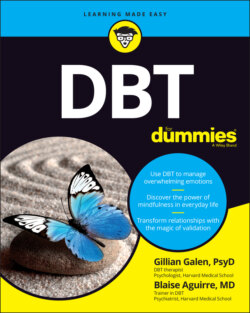Читать книгу DBT For Dummies - Gillian Galen - Страница 92
Asking a few helpful questions
ОглавлениеOnce you’ve recognized and labeled your emotions, you may want to ask yourself some questions to help you think through what skills will be the most effective. We recommend that you practice doing this so that it becomes a habit. Consider asking yourself these questions:
1 How can I validate my current emotion?
2 Do I want to tolerate and accept this emotion so I can ride it out like a wave?
3 Do I want to increase or decrease the intensity of this emotion?
4 Do I want to stay miserable?
5 Do I want to do something to make it worse?
We review many skills to help you tolerate, as well as increase and decrease, the intensity of your emotions in Part 3 of this book.
Often people get confused at question numbers four and five in the preceding list:
Sometimes, staying miserable for a period of time can be validating. It’s okay to do that. That being said, we include it as number four because we want that to be a choice made with intention and not a state that you find yourself stuck in, not realizing how you got there. You can think about it like this: It’s okay to throw yourself a pity party — sometimes we all just need that — but you need to know that you’re going to the party, so that after a reasonable period of time, you know how to leave.
Number five is there for similar reasons; it will help you avoid falling into the trap of making things worse. Remember, you can almost always make your situation and emotions worse. Our hope is that you learn this as an option so that you can experience this emotion less. It isn’t uncommon for this to happen in a split second and with little awareness. The idea is to slow yourself down. It may seem like an obvious example, but when you’re angry and you punch a wall, it may feel good in the moment when you get a huge rush of adrenaline, but then you just have a hole in the wall that you need to explain and then fix. You have worsened your problem, and if you’re like many people, you’ve piled on an intense feeling of shame.
If you can keep these questions in mind, you can build the awareness to decrease reactivity and increase your sense of choice of how to move on a skillful path toward regulation.
